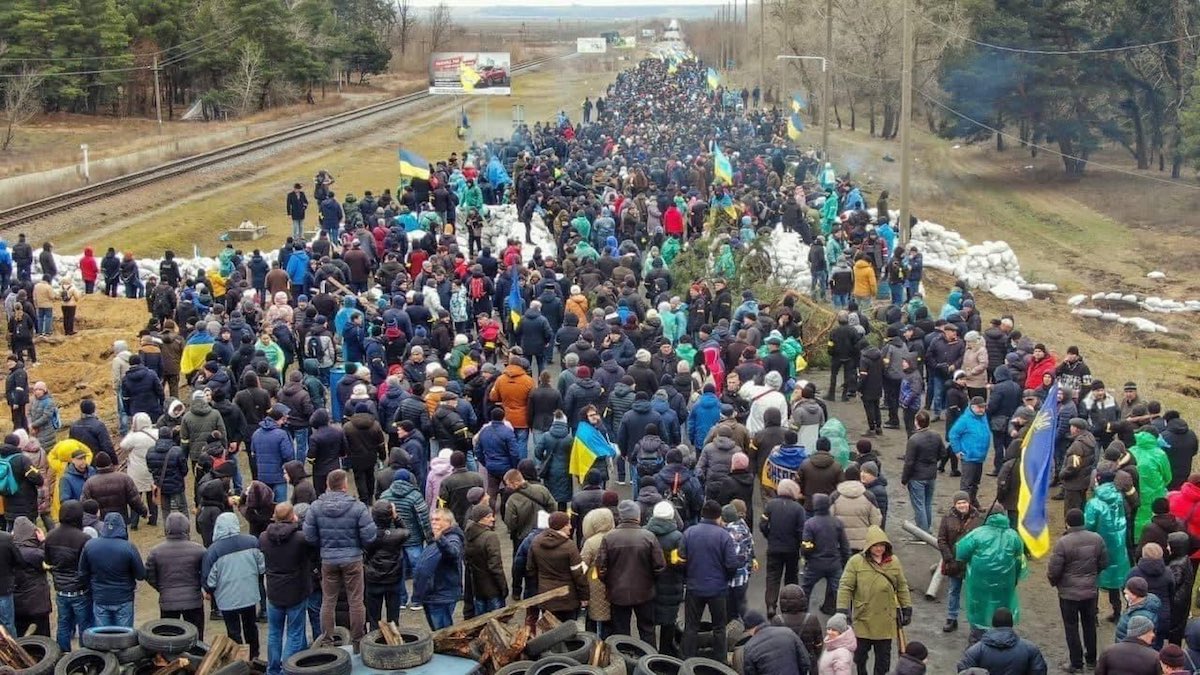Bodies were removed from the rubble on the 40th day" - death and destruction that Russian army leaves behind
Civilians killed in Ukrainian war
After the withdrawal of Russian troops from the capital of Ukraine, in almost every city and village left by the Russian military, every day more and more bodies of civilians are found – killed or buried under the rubble. The Ukrainian Hromadske outlet talks about the horrors that the Russian army left behind in its report.
In the Kyiv region, rescuers continue to dismantle the rubble after the invasion of “Russian liberators”. Under it, the bodies of the dead continue to be discovered. In the cities under occupation, the police record new crimes of the occupiers against the civilian population.
On April 12, a mass grave was discovered in the village of Buzovaya. Earlier, 133 bodies of civilians were found in Makarov. The exhumation of bodies from the mass graves of Bucha continues.
Every resident of the Kyiv region, who survived the hell of war, has their own story.
In Borodyanka…
…rescuers continue to dismantle the rubble. At the entrance to the city, the buildings were destroyed to the ground. Bombed residential buildings stand along the street leading to the newly famous, shot, but still standing, monument of Taras Shevchenko.
Rescuers are based in the main square of the village. At the pedestal, musicians who call themselves the “Kobzar Armada” sing “Oh, there is red viburnum near the puddle”.
“We raise the spirit and protect Ukraine with what we do best”, the musicians explain.
У Бородянці музиканти, що називають себе «Кобзарська армада», співають «Ой, у лузі червона калина» pic.twitter.com/HGYbGWcGPR
— hromadske (@HromadskeUA) April 11, 2022
Near the bombed-out houses, people patiently watch the work of rescuers. Some of them came here because they are waiting for their relatives to be pulled out from under the rubble. Some take things from partially surviving apartments.
“People are asked to simply go into the apartment, pick up things. We help them. Sometimes we take out the furniture”, says rescuer Sergei.
- “Ukraine is repsonsible for the war it is losing” – who spreads pro-Russian propaganda in Georgia
- Op-ed: Who is speculating on the fear of war in Georgia and why?
On the ruins of the house, he found someone’s collection of banknotes. We hope that their owner will see the photos and take them one day.
“If these ‘liberators’ hadn’t fired at the rescuers, we would have been working here from the first day,” Sergey adds.
The house near which he works was hit by a shell 40 days ago. Rescuers disassemble the rubble only the second, before that, pyrotechnics worked there. Two days later, the bodies of two men were found here. There is information about at least two more people who may be under the rubble.
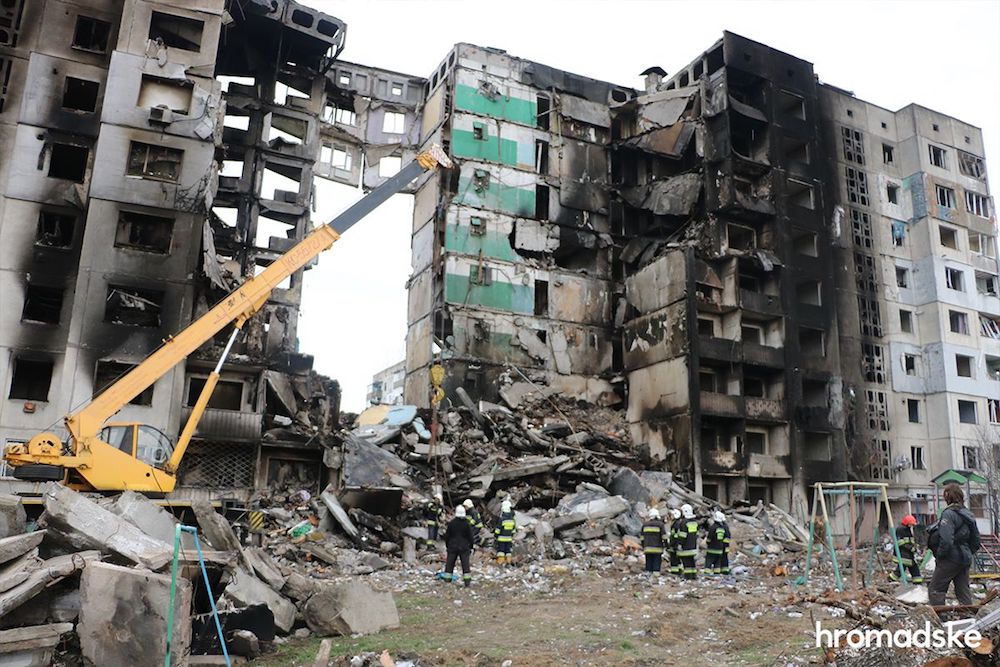
Photo: Nadezhda Dry / hromadske
A woman sits in front of the house, waiting for rescuers to get her daughter-in-law and four-year-old granddaughter. Today she already recognized the body of her deceased son. It is difficult for Valentina to speak, so her sister Tamara tells her story.
“In the first days during the shelling, they were in the surviving apartment. And that day my sister called me and said: “Toma, maybe they will move to you, to the private sector?” I said of course!”, the woman recalls. ” But later she said: the son said that it was too late. They ran to the basement”.
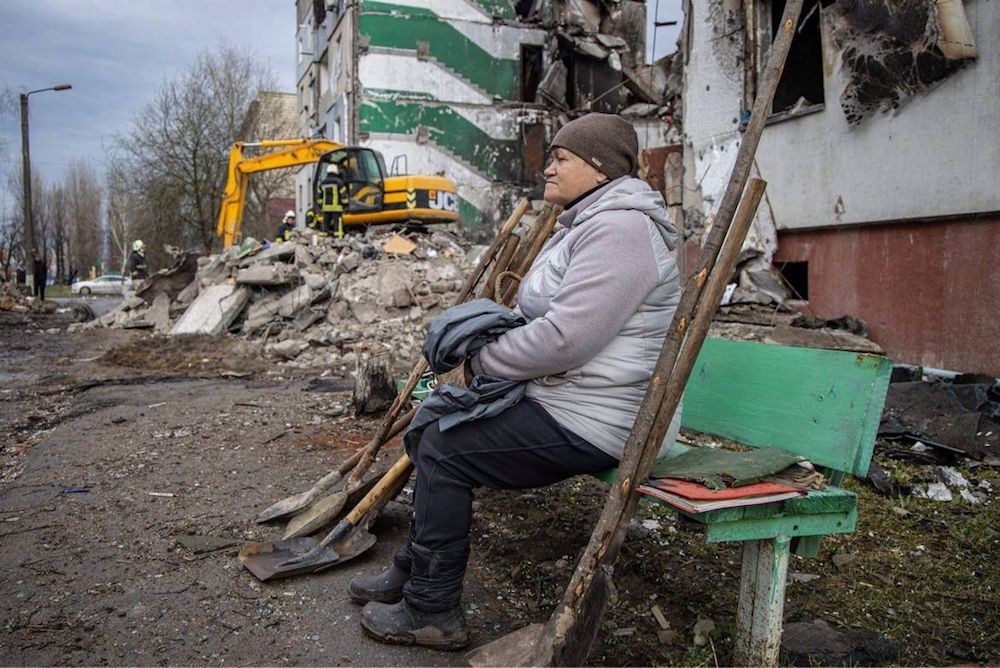
At first, the woman admits, they hoped that her nephew and his family had evacuated from Borodyanka and simply did not get in touch. But a few days ago, neighbors said they saw Vitaly that day.
“Neighbors said that the child screamed so much that they can still hear that scream. We came there (to the house – ed.) three days in a row. Didn’t sleep at night. Today he was taken out, on the 40th day. My sister recognized her son because she found the keys to the apartment, flash drives in her pocket. On his little finger was the ring of his child. They also found the girl’s blouse and handbag”.
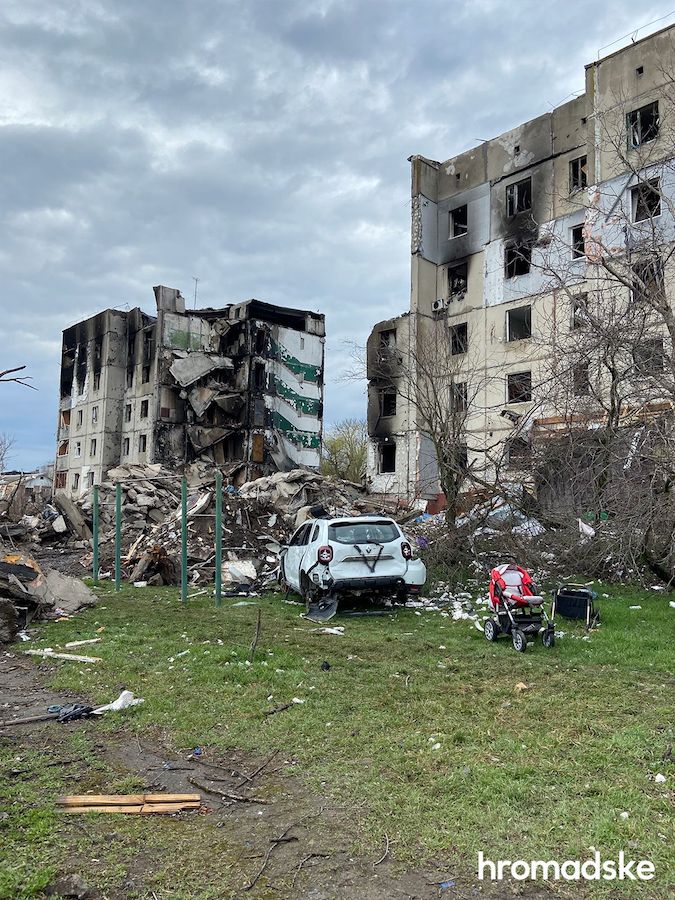
According to Tamara, the grandmother spent a lot of time with her granddaughter, because her parents worked a lot. Shortly before the tragedy, the girl lived in a private house with her grandmother, but then her parents took her away. The last words that she said to Tamara’s sister were: “Grandma, I’ll come back to you”.
Vyshegrad…
… the invaders entered it on March 3. Its residents remember that day with horror – they talk about the so-called “cleansing”. Russians killed two people with shots in the head. Several were injured.
“He was killed with a bullet in the head, they went into the house, they shot him, they didn’t even talk. And the investigators also say that they were probably beaten. There are bruises on the body”, says Eugene. His father, Yuri, who was shot by the invaders, was buried right in the courtyard.
The son found out about the incident only two weeks later.
“We talked with him on March 3. I called by phone, but it was already heavy. Maybe we weren’t talking to him anymore. The voice was completely different”, recalls the man.
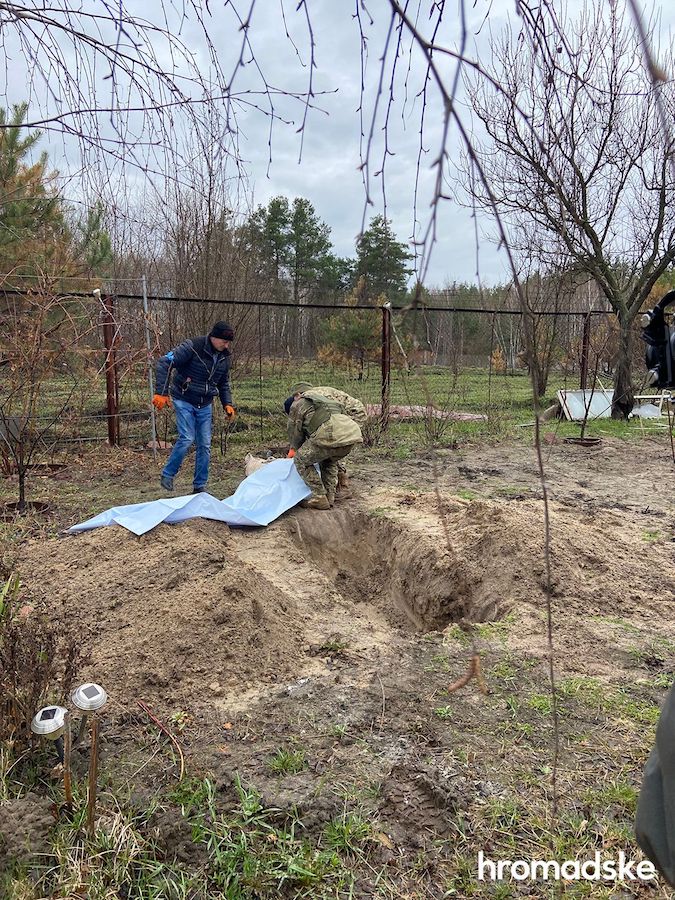
Hope Dry / hromadske
Another grave was discovered by the police in a neighboring yard. The invaders killed the owner of the house, a former doctor. And the wounded wife and her daughter, according to the local residents, were evacuated to Belarus against their will.
“They shot at everyone they didn’t like. The doctor was shot in the head, he was carrying water. Yuri was shot in his bed”, recalls Zhenya, another neighbor.
“On the third day, the Russians came. They tried to break in, but we did not open the door, they sat in the house for four days. It got to the point that when the water ran out, they washed the plates with vodka, and wiped them with books. A few days later they came again and knocked out the locks. Mom left. These were no longer the same people, but Buryats. They said: “We will not shoot, we know that a disabled person lives here”.
When they first entered the village, says Zhenya, they herded everyone on the street to a neighbor’s big house and took away their phones. And they went home.
This is confirmed by Galina Yakovlevna. She went to the neighbor, to whose house the invaders drove the residents, to charge the phone.
“When I went to get the phone, I didn’t know yet that Pavel Vasilyevich had been killed. I saw windows being broken in his house on the second floor. When I came, I looked: there was a broken generator and two shot dogs. And they were there with machine guns. They killed Pavel Vasilyevich and Yura and forced our guys to bury them”.
In Kolonshchyna…
… we meet a woman returning home on a bicycle. Her name is Lydia. She was visiting the local cemetery. Her husband would have turned 43 today. But Sergei and his 14-year-old neighbor Denis were killed by Russians.
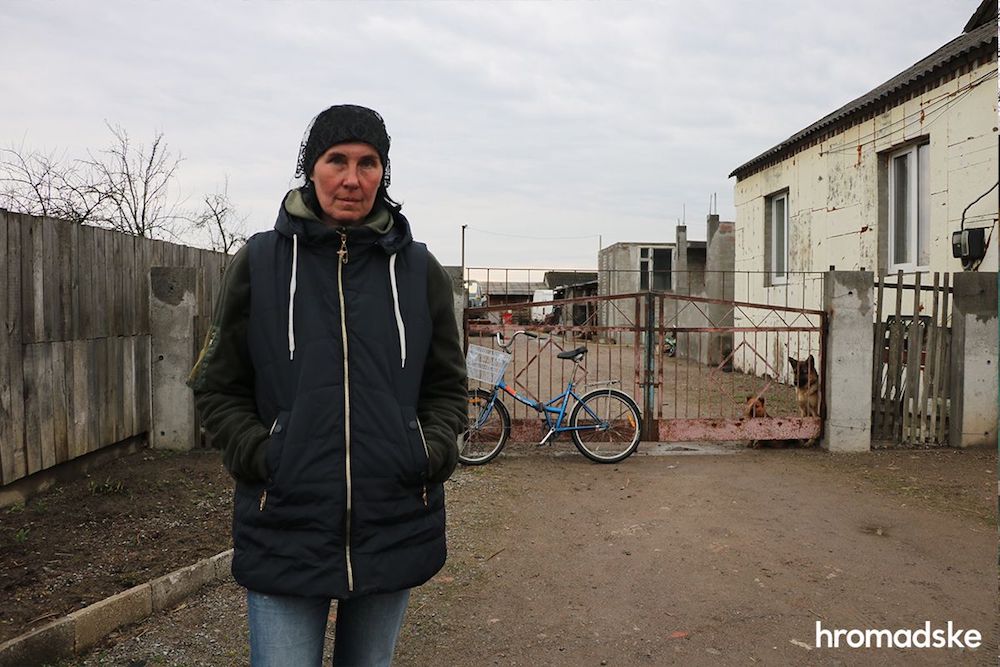
“The boy, a neighbor, just came to visit us sometimes. At that time we didn’t have electricity, and there is a house with solar panels further along the road. People left it and left my husband the keys. And he went there to charge batteries, phones”, recalls Lydia. “On the first or second day, when the Russian invaders entered, he took Denis and went there to pick up the battery. The Russians shot them. They did not reach the house – they were found near the fence.
Sergei did not want to leave the village after the occupation, because he was convinced that the invaders would not shoot civilians.
“He did not think that they would and did not want to leave. We have a big farm. He said: “Where will I go? They will not shoot at civilians. I don’t have weapons – why would they kill me?”. He was sure that these were adequate people”, says Lydia.
On that day, her husband and the boy next door did not have weapons or dangerous objects, they were dressed in ordinary village clothes.
According to the woman, in the first days after the disappearance, it was not safe to look for a man. When it seemed that it became a little calmer, the woman asked the villagers to look for a man. On the fifth day, they were found together.
“Thank God, at least they let me bury him in the cemetery”, Lydia says.
In Motyzhin…
… we ended up there almost immediately after the release. Our cameraman went to the center of the village, and I stayed near the checkpoint.
Two sisters, Vera and Zhenya, upon seeing the journalists, invited us to have coffee and waffles brought by volunteers. They say that after the liberation of the village they have a lot of this. They also show the bread that volunteers brought to the village during the occupation.
Vera asks if there is any news about Bucha. There is no communication in the village, and women have not heard about hundreds of those killed by the occupiers in the city. Vera has a daughter there, with whom there has been no connection for several weeks. She does not know about the fate of her child.
Zhenya lived in Kyiv. In Motyzhin, she fled to her sister from the war. But the Russian troops entered the village, and the battles were going on here every day.
Women had to sleep in their clothes, and from shelling they ran to hide in the cellar across the street. It wasn’t safe there, but it’s easier to think you’re in hiding, Vera shares.
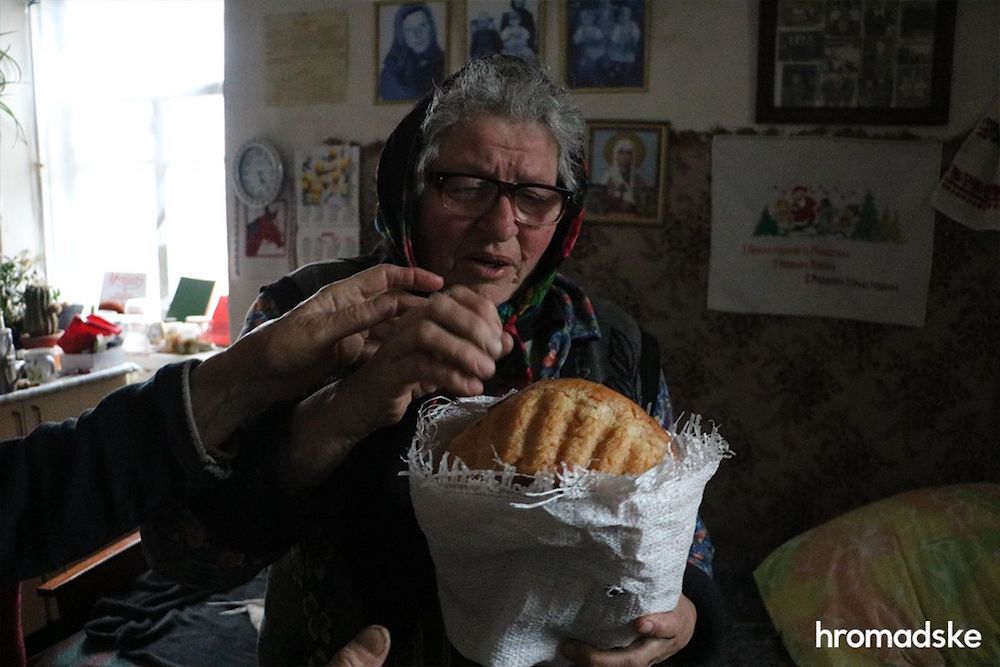
Photo: Nadezhda Dry / hromadske
During the war, the woman began to keep records. She admits that she was afraid that the invaders would find them, but she continued to write:
“I overheard the conversation. I thought that the drugs were brought. I open the door, and along the street were soldiers. I slowly closed it and looked through the gap. Two people came up to our gates, turned, and went on.
In the evening we visited Natasha’s neighbor in the yard. She had two dogs. When it calmed down, Zhenya ran to see what was being done there. She saw a dead dog, an ax, broken windows.
“We’ve been out of work for a month. Knitting socks is a little distracting. And all the same, the heart is constantly pounding, the head hurts, the body is shaking. All sorts of horror stories run through my head. I’ll tell Zhenya that if something happens to me, she should bury me under the apple tree. If anyone survives, he will be buried with his mother. The information must be written on the wall of the house. How else?”
Night of March 27th. Holy Sunday. The night is quiet. In the morning there was some shooting in the distance. We heard about Mariupol, Lviv, and Lutsk. Gas went out after yesterday’s fight and still hasn’t come back”.
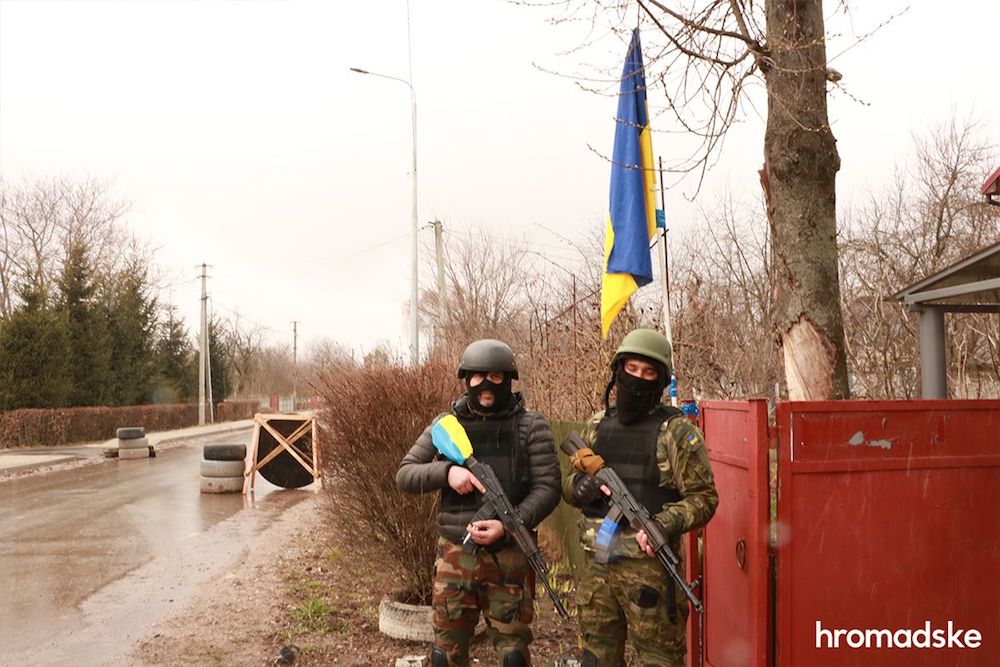
Hope Dry / hromadske
When Motyzhin was released, the women wept as they greeted the soldiers.
At the end of the conversation, Zhenya asks to call her son. My phone has two percent, but we’re trying. The son replies that he is safe. The woman asks if there is anything heard about her daughter Ksyusha, who was in Bucha. In response, we hear the main thing: she is alive.










